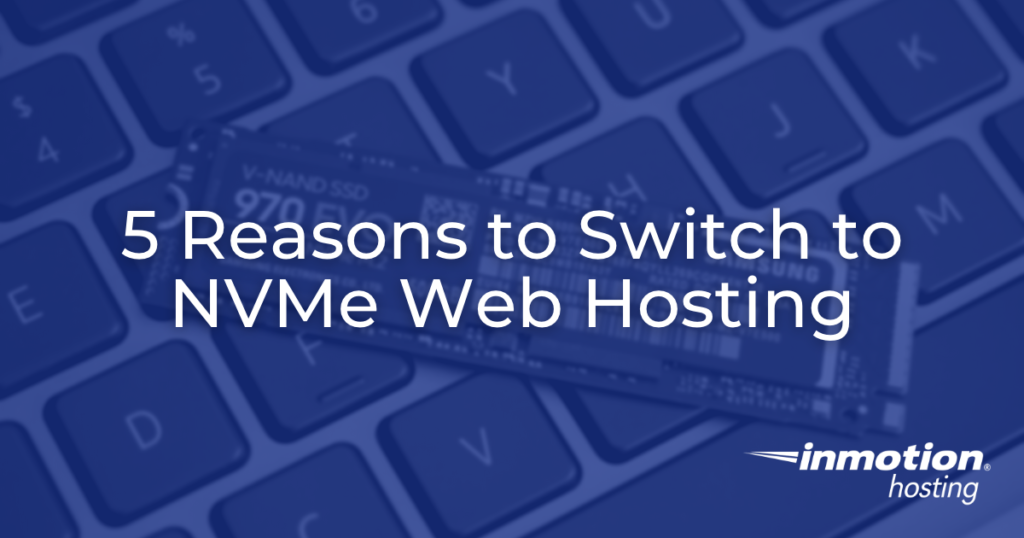
As website traffic and data volumes continue to grow, website owners need hosting solutions that can keep up. This is where NVMe hosting comes in – an innovative hosting technology designed to meet the demands of modern websites.
Whether you have a Shared Hosting account, or a VPS Server, NVMe servers provides faster digital storage, less latency, better uptime, and superior performance. However, some Linux server hosting users may be hesitant due to concerns about price and return on investment (ROI).
Read on to discover the benefits of NVMe web hosting and why you should consider upgrading now.
- What is NVMe Web Hosting?
- Top Benefits of NVMe Hosting for Website Hosting
- Is NVMe Hosting Worth it?
What is NVMe Web Hosting?
NVMe stands for Non-Volatile Memory Express, which is a type of technology used to improve the performance of storage drives. It is a faster and more efficient way of accessing data from solid-state drives (SSDs) than traditional storage protocols. NVMe can help speed up data transfer rates, reduce latency, and improve overall performance.
NVMe hosting, on the other hand, is a hosting solution that uses NVMe SSDs as its primary storage device. This means that websites hosted on NVMe servers will have faster load times, better performance, and improved user experiences.
NVMe web hosting is designed to handle high volumes of website traffic and data transfer requests. It is ideal for websites that need fast and reliable hosting solutions, such as e-commerce sites, media-heavy sites, and high-traffic blogs.
The benefits of NVMe hosting include faster data transfer speeds, lower latency, and increased reliability. These benefits are especially important for websites that need quick access to large amounts of data or media content. Additionally, NVMe web hosting offers improved security features to protect sensitive data and prevent unauthorized access.
Types of NVMe Web Hosting
Shared Hosting
Shared hosting is the most basic and affordable type of web hosting available. With NVME shared hosting, you share server resources with other website owners. While shared hosting may be cost-effective, it may not provide the best performance, uptime, or reliability compared to other types of NVMe hosting.
WordPress Hosting
WordPress hosting is a specialized type of shared hosting designed specifically for WordPress websites. With NVMe WordPress hosting, you get faster data transfer speeds and lower latency, which means faster loading times for your WordPress website. This type of hosting is perfect for bloggers, small businesses, and anyone who wants to get their WordPress site up and running quickly.
With Managed WordPress hosting powered by NVMe VPS servers, website owners can leverage more NVMe resources for added benefits such as:
- Improved website performance
- Faster page loading times
- Reliable uptime
VPS hosting provides better resources and scalability. As a result, website owners can handle larger traffic volumes and complex applications.
VPS Hosting
Virtual Private Server (VPS) hosting is a step up from shared hosting. With NVMe VPS hosting, you get your own dedicated resources on a virtual machine. This means better performance, uptime, and reliability. VPS hosting is ideal for websites that require more resources and flexibility than shared hosting can offer.
Dedicated Servers
For the ultimate in performance, uptime, and reliability, dedicated servers are the way to go. With a NVMe dedicated server or bare metal server, you get an entire physical server dedicated solely to your website. This type of hosting is ideal for:
- Large websites with high traffic volumes, or
- Businesses that need the greatest control over their web hosting environment.
Upgrade to VPS Hosting for Peak Performance
Upgrade to InMotion VPS Hosting today for top-notch performance, security, and flexibility, and save up to $2,412 – a faster, stronger hosting solution is just a click away!
SSD Storage
High-Availability
Ironclad Security
Premium Support
NVMe Web Server Components
An NVMe web server is made up of several components that work together to provide fast and reliable hosting. These components include the NVMe SSD, the CPU, the RAM, and the network interface card (NIC).
The NVMe SSD is the heart of the server, and it is where all the data is stored. NVMe SSDs are incredibly fast and reliable, which makes them ideal for web hosting. They are designed to deliver high-speed data transfer rates, low latency, and high IOPS (input/output operations per second).
The CPU, or central processing unit, is the brain of the server. It processes all the requests and commands sent to the server by the users. The CPU needs to be powerful enough to handle the workload of the website, especially if it has high traffic and complex applications.
The RAM, or random-access memory, is where the server stores the data it is currently working on. The more RAM a server has, the faster it can access data, which improves the website’s performance.
The network interface card (NIC) connects the server to the internet. It is crucial to have a fast and reliable NIC to ensure that the website can handle high traffic and deliver fast data transfer rates.
Non-Volatile Memory and PCI connections are vital for hosting. Both components are designed to deliver fast and reliable data transfer rates. Non-Volatile Memory, such as NVMe SSDs, retains data even when the power is off, which means that the data is always available. PCI connections, or Peripheral Component Interconnect connections, provide a high-speed data transfer path between the CPU and other components, which reduces latency and improves performance.
Skip to Top Benefits of NVMe Hosting
Non-Volatile Memory
Non-volatile memory is a crucial technology that enables the storage capabilities of NVMe drives.
To put it simply, non-volatile memory refers to a type of computer memory that can retain its stored data even without power. This means that when the power is turned off, non-volatile memory can still preserve the data it has stored.
On the other hand, volatile memory is a type of computer memory that requires power to maintain its stored data. In other words, when the power is turned off, volatile memory will lose all the data it has stored.
Non-Volatile Memory vs Volatile Memory
| Non-Volatile Memory | Volatile Memory | |
|---|---|---|
| Definition | A form of memory that stores data even without power | A form of memory that requires an input of power to store data |
| Pros | Long-term data storage | Often faster than non-volatile memory |
| Cons | Lower data-transfer rates that can force computer systems to rely more on RAM | If power is lost, data is lost too. Not reliable for long-term data storage |
| Found in | Computer Hard Drives | RAM |
The PCIe Interface
NVMe SSDs rely on a special type of computer connection called PCIe, or Peripheral Component Interconnect Express. This interface enables various components of your computer system to communicate with each other, including NVMe drives.
PCIe is essential to NVMe hosting because it provides a faster and more direct connection between the server storage and the CPU. This allows your website visitors to access data more quickly, while also improving the efficiency of your web hosting system.
Compared to traditional solid-state drives, NVMe drives stand out because they use PCIe to achieve much higher data transfer rates. This means that NVMe web hosting can offer faster performance and better user experiences.
Comparing NVMe, SSD, and HDD
NVMe Hosting, SSD Hosting, and HDD Hosting are all storage options for web hosting. However, they differ significantly in terms of speed, reliability, and cost.
SSD Hosting, which stands for Solid State Drive Hosting, is a type of web hosting that uses solid-state drives for data storage. SSDs are faster than traditional hard disk drives (HDDs) since they don’t have any moving parts. Therefore, SSD hosting is more reliable, efficient, and faster than HDD hosting.
NVMe Hosting, on the other hand, uses NVMe SSDs which offer even faster data transfer rates and lower latency than traditional SSDs. NVMe drives are designed for high-performance computing and are an excellent choice for websites that demand fast, reliable hosting.
In contrast, HDD Hosting uses traditional hard disk drives which are slower than both SSDs and NVMe SSDs. However, they tend to be more affordable and offer higher storage capacity. This makes them a good option for websites that require large amounts of storage, but not necessarily the highest speed.
NVMe Hosting vs Traditional Hosting
| Feature | NVMe Hosting | SATA SSD Hosting | HDD Hosting |
|---|---|---|---|
| Data Transfer Speed | Very Fast (up to 7000 MB/s) | Fast (up to 600 MB/s) | Slow (up to 150 MB/s) |
| Latency | Very Low (less than 0.1 ms) | Low (around 0.1 ms) | High (around 10 ms) |
| Uptime | High | High | Low |
| Power Consumption | Low | Low | High |
Top Benefits of NVMe Hosting for Website Hosting
Using NVMe storage can improve performance by reducing the time it takes to access and transfer data. This can help to reduce bottlenecks and improve the efficiency of a server and website.
It can also help to improve the response times of web applications. This is especially important for dynamic websites or websites that host a lot of users at one time.
1. NVMe Provides Superior Website Performance
NVMe drives significantly improve website performance, especially in high-traffic environments.
The use of PCIe technology provides fast access to data, with faster read and write speeds than traditional SSDs. Fast response times and quick access to data are critical for websites with high traffic.
NVMe drives have higher IOPS than SATA and SAS drives. This helps handle large numbers of website visitors and other data-intensive tasks.
NVMe drives can also be particularly helpful for websites with large databases. They can speed up database queries and improve database access times. As a result, website loading times are faster, and website performance is improved.
Quick Tip: Upgrading to HTTP/3 is another way to boost your web server performance for free, as it is supported by existing software on your web server.

2. NVMe Enhances User Experience
In today’s fast-paced world, customers expect web pages to load in under two seconds. With NVMe hosting, improvements in IOPS and data transfers result in faster and more responsive website experiences for visitors.
NVMe drives also offer low latency access times, which means users can access data from storage quickly. This results in quicker database queries and faster access to content for website visitors. For example, if your portfolio website offers high-resolution videos or images, switching to NVMe hosting can help load your content faster than a non-NVMe server.
Moreover, website loading time is a significant factor in SEO rankings. Therefore, faster load times for high-quality content can lead to better user experiences overall.
In sum, NVMe hosting provides faster data transfer rates, low latency access times, and quicker access to content, all of which contribute to better user experiences.
3. NVMe Improves the Reliability of Your Website
Quick and easy access to your content makes your website more reliable and trustworthy to your visitors.
The boost to your website performance means that visitors are less likely to experience slow load times or error messages.
NVMe hosting, by design, is more stable, energy efficient, and less vulnerable to downtime.
In fact, NVMe drives are less prone to generate heat which often decreases the reliability of servers in data centers. Thus, your website is less vulnerable to unexpected interruptions or downtime due to hardware failure.
In turn, the reliability of your website can help to build trust with your visitors and keep them coming back for more.
4. NVMe is Scalable and Cost-Effective
When it comes to web hosting, scalability and cost-effectiveness are key considerations. That’s why NVMe Hosting is the ideal solution for website owners looking to scale their operations without breaking the bank.
NVMe technology is designed to handle high volumes of data and traffic, making it easy to scale your website as your needs evolve. With faster data transfer speeds and lower latency, your website can handle more simultaneous requests and processes, ensuring that it runs smoothly even with increasing traffic.
The best part? NVMe hosting is a cost-effective choice that can save you money in the long run. By eliminating the need for frequent upgrades or replacements, you can keep your website running smoothly without squeezing your budget.
So, whether you’re a small business owner looking to expand your online presence or a large enterprise looking to optimize your web hosting infrastructure, NVMe hosting is the scalable and cost-effective choice for you.
Quick Tip: Instead of upgrading from a managed VPS to a dedicated server, you can opt for a NVMe SSD VPS.
5. Your Website’s Data is Secure
When it comes to your website’s data, security should always be a top priority. With NVMe hosting, you can rest assured that your data is stored on super-fast and secure solid-state drives (SSDs).
NVMe SSDs support advanced encryption to protect your data from unauthorized users. This means that it is much harder for cybercriminals to steal sensitive data like user passwords and personal information.
NVMe hosting plans often come with extra security features to help protect your website from potential threats and data loss. Some of these features include:
- Firewalls
- Malware Scanners
- Regular Data Backups
By having multiple layers of protection in place, NVMe hosting helps ensure the safety and security of your website’s data.
Is NVMe Hosting Worth It?
Are you looking for fast, reliable, and secure website hosting? Then it’s time to consider NVMe hosting. With NVMe SSDs becoming an industry standard in web hosting, there are now plenty of NVMe options available, such as NVMe Shared Hosting or VPS Hosting.
But before you make the switch, ask yourself some questions.
- Is your website traffic growing?
- Do you host complex web applications?
- Are you handling large volumes of data?
- Do you need advanced security features?
If you answered yes to any of these questions, then NVMe web hosting is definitely worth it for your website.
NVMe hosting offers faster data transfer rates, lower latency, and increased reliability. With NVMe, your website visitors will experience quicker database queries and faster access to content. Additionally, NVMe technology provides advanced security features to keep your website and data secure.
So, if you think your website could benefit from NVMe servers, talk to a web hosting expert today. They will help you find the right NVMe web hosting plan for your website’s specific needs. Don’t settle for slow and unreliable hosting. Upgrade to NVMe hosting today for a faster, safer, and more reliable website experience.

Is InMotion going to offer NVMe drives for Managed WordPress Hosting and Managed VPS plans? Also, any news on OS migrations for the Managed WordPress plans and VPS when CentOS 7 EOL comes up in 2024?
Other NVMe hosting plans will be coming eventually. I have no info regarding migrations when CentOS hits EOL. If you’re looking to get away from CentOS or cPanel, there’s always our bare-bones Cloud Server Hosting with Debian or Ubuntu Server.